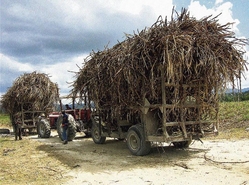The real price of Eridania's sugar
Published: Wednesday | August 19, 2009

Minister of Agriculture Dr Christopher Tufton.
The 79,000 tonnes (174 million pounds) forward-sold to Italian-owned Eridania Suisse SA, could cost the state as much as US$45 million ($4 billion), assuming that the factories perform at 2008 levels when unit costs were 26 US cents per pound.
But if, as sugar officials intend, the factories are upgraded and the new efficiencies introduced are sufficient to bring production costs down to 18 US cents per pound in time for this year's crop, Eridania's supplies would cost US$31.3 million (J$2.8 billion) to churn - still more than double the seed money available to Jamaica.
Agriculture Minister Christopher Tufton has said, however, that Jamaica can produce Eridania's sugar at US$21 million (J$1.87 billion).
But getting to that price would require the limping sugar factories to become so super-efficient as to outperform even Brazil, which is on top of its game at 14 cents per tonne.
Eridania, a European company based in Geneva but owned by the Maccaferri Group of Italy, has committed upfront payment of US$15 million for the 79,000 tonnes, the source from which Jamaica says it will finance the next sugar crop.
Some 43,000 tonnes will be done at Frome, and 36,000 tonnes at Bernard Lodge but processed at nearby Monymusk.
Jamaica has already got a US$5 million downpayment from Eridania, and will receive the rest in two tranches, according to Tufton and his sugar advisors, speaking at a meeting with Gleaner editors and senior writers.
The other US$22.7 million of an estimated US$37.7 million (euroor €335 per tonne at full payment for the Jamaican sugar, will be remitted at a later date - schedule unknown.
The two parties will also share any profits accruing from the sales when the sugar hits Europe.
Jamaica is still tidying up negotiations with Eridania but feels assured that the deal is virtually sealed, because of supply gaps in Europe.
This week, the opportunities in the world market opened up even further, sending sugar prices to new highs of 23 cents per pound on demand by countries like Mexico which announced a week ago it had a 400,000 tonne supply gap and needed the sweetner to buy.
Europe, according to Ambassador Derrick Heaven of the Sugar Industry Authority, consumes 17.5 million tonnes of sugar, but supplies are at 13.5 million tonnes - a consequence of the weeding out of inefficient beet producers whose operations became unsustainable after the EU, under free trade pressure, became less generous with sudsidies that were distributed under the rubric of the Common Agricultural Policy.
Downpayment
Eridania reportedly commands 30 per cent of the European market, and sees the opportunity to grow its share, according to Heaven and sugar negotiator Aubyn Hill.
Jamaica will use Eridania's US$15 million downpayment as working capital to fertilise fields, install an irrigation system, and retool the factories in preparation for churning of the cane at the start of the crop year, which normally kicks off in late November or December.
That still leaves the Sugar Company of Jamaica - which Hill is tipped to chair after finalization of the asset sales and reconfiguration of the organisational and corporate structure - short of US$16 million to US$30 million, depending on the level of efficiency attained in the operation of the factories to remain in state ownership.
A US$21 million figure has been floated as the cost to produce Eridania's 79,000 tonnes, but Hill later told Wednesday Business that was something of a moving target.
It was however on that estimate that Tufton reported to lawmakers in mid-July that the next sugar crop would leave Jamaica with a funding gap of US$5 million to US$6 million which he hoped to cover by finalizing the sale of the estates up for divestment.
A US$21 million bill would, at a Wednesday Business estimated unit cost of 8.6 US cents/pound, require Jamaica to be twice as efficient as Brazil which produces at 14 US cents, and as locally owned Worthy Park whose cost is around 18 US cents/pound.
Indeed, Tufton and Hill have said that the aim, at the very least, is to match the cost structure of the privately owned Worthy Park, eventually.
Market access
Last year, Jamaica produced 140,872 tonnes of sugar, which at the 26 US cents price quoted by Hill, would have cost more than US$80 million or J$5.8 billion equivalent to mill.
At June 2009, the estates had produced 123,395 tonnes and exported 108,000 tonnes, with one month left to go in the crop.
The guaranteed price for Caribbean sugar entering the EU will no longer apply under the Economic Partnership Agreement, starting with this coming crop, but market access is still assured.
Jamaica in 2008 earned US$104.7 million (J$8.4 billion) for 136,070 tonnes of export sugar, a US$24 million premium on Wednesday Business' estimated cost to produce the sweetner.
Jamaica is selling as many of the sugar assets as it can. Eridania, for example is said to be interested in buying Frome for conversion to a sugar refinery. Other assets have been sold to Golden Grove, a partnership of Seprod Limited and Fred M Jones Estates, and to the Hussey family.
SCJ is selling the assets free of debt.
Instead it will spin off some J$18 billion of liabilities into a company called SCJ Holdings Limited, to be chaired by Robert Levy. Levy is the current chair of the SCJ.
lavern.clarke@gleanerjm.com

A tractor load of cane being transported on the Frome estate in Westmoreland where the majority of Eridania's sugar will be produced.
- File photos






















